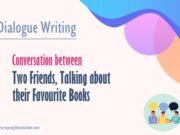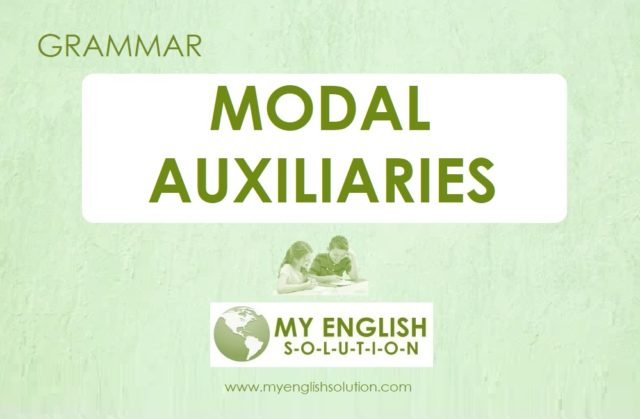| AUXILIARY VERB |
| Auxiliary Verb is also known as Helping Verb. It helps the Main Verb to describe the Past, Present and Future actions in the sentence. It is used to form Tense, Mood or Voice of other verb. There are two types of Auxiliary Verbs- • Primary Auxiliaries: (Modify other verbs in a full verb phrase) To be: am, is, are, was, were, being, been, will be To have: have, has, had, having, will have To do: do, does, did, will do • Modal Auxiliaries: |
| MODAL AUXILIARIES |
| Modal Auxiliary Verb is a verb which is used to indicate mode or modality. It connects with another verb to demonstrate a Mood or Tense. It affects the meaning of other verb in different situations. |
| USES OF MODAL AUXILIARIES |
• CAN: (ability, possibility, permission, request) Smith can speak several languages. It can rain heavily tonight. You can present your slideshow. Can I use your phone, please? • COULD: (possibility, ability, suggestion, request, permission) • SHALL: (futurity, suggestion, promise, threat, determination, obligation, prohibition) • SHOULD: (moral duty, obligation, advice, suggestion, assumption, expectation) • WILL: (futurity, request, determination, promise, refusal, willingness) • WOULD: (past habit/routine, wish/willingness, polite offer/desire, conditional, consequence, request) • MAY: (possibility, permission, request, wish, polite offer) • MIGHT: (possibility, suggestion, conditional, permission, request) • MUST: (compulsion, obligation, determination, advice, threat, intention, necessity, prohibition) • OUGHT TO: (expectation/advice, probability, obligation, guess) • HAVE TO/HAS TO: (certainty, compulsion, duty, obligation, necessity) • USED TO: (past habit, past existence) • NEED TO: (necessity, obligation) • DARE TO: (courage) |

| Activity Set 1 |
Fill the blanks with appropriate modals.
(Could, must, can, would, should, used to, will, may)
1. You ……… obey your parents and teachers.
2. They …..…. do it finally, with lots of hard work.
3. We …..… visit a temple with our grandparents.
4. .…… I borrow your pencil for some time?
5. He ……. abide by rules and regulations all the time.
6. I …….. speak three languages fluently.
7. She ……… go to school on foot.
8. …….. you please, help me out?
9. They …….. discuss these issues today in the meeting.
10. It ….… rain this evening.
(Answers: 1. Must 2. Could 3. Used to 4. May 5. Should 6. Can 7. Would 8. Could/Will 9. Will 10. May)

| Activity Set 2 |
Fill the blanks with appropriate modals choosing from the options given into brackets.
1. I ………. finish this project before the deadline. (might/have to)
2. You ………. be kidding. (can/must)
3. This pandemic ……….. end up at the earliest. (shall/should)
4. …….. you please, sanitize your hands properly? (may/would)
5. We ………. wind up this work now, as it’s too late. (will/need to)
6. If I were in your place, I ……… not do that at all. (must/would)
7. You …….. not say sorry, it’s not your fault. (will/need)
8. It’s raining cats and dogs right now, so I ………. not step out. (might/will)
9. There was a time, when I ……… burn the midnight oil. (would/can)
10. According to many scientists, this pandemic ……… end soon. (shall/may)
(Answers: 1. Have to 2. Must 3. Should 4. Would 5. Need to 6. Would 7. Need 8. Will 9. Would 10. May)

| Activity Set 3 |
Fill the blanks with appropriate modal auxiliary verbs.
1. My grandfather is a centenarian, but he ………… still read and write without glasses. (Ability)
a) Shall
b) Might
c) Should
d) Can
2. ……….. I stay here for an hour? (Permission)
a) Will
b) Can
c) May
d) Must
3. …………. you lend me this book for two days, please? (Polite request)
a) Could
b) Will
c) Can
d) Must
4. There was a time when I …..….. compose poems on various themes. (Past ability)
a) Would
b) Might
c) Could
d) May
5. You ……….. not worry about that, we all are here to take care. (Necessity)
a) Should
b) Will
c) Need
d) Must
6. We ………… not break laws as we are the responsible citizens. (Prohibition)
a) Will
b) Must
c) Can
d) Might
7. I ……………. take care of everything for you. (Promise)
a) Should
b) Have to
c) Must
d) Will
8. Our country …………. become one of the developed countries soon. (Possibility)
a) Must
b) May
c) Should
d) Has to
9. She ………… go to college today as she is feeling better now. (Weak possibility)
a) Should
b) Might
c) May
d) Will
10. It is very frosty outside, so I ………… stay inside the home only. (Intention)
a) Must
b) Should
c) Can
d) Will
(Answers: 1. Can 2. May 3. Could 4. Would 5. Need 6. Must 7. Will 8. May 9. Might 10. Will)

| Activity Set 4 |
Fill the blanks with appropriate modals.
(Can, couldn’t, have to, might, must, ought to, shouldn’t, and was able)
1. It’s very cloudy today. Do you think it ——— rain later?
2. You ——— talk back to your parents.
3. They ——— have locked the door before they went out.
4. My laptop stopped working out while making a presentation, but luckily I ——— to fix it.
5. My mother says we ——— eat properly to keep ourselves healthy.
6. You don’t ——— help me at all, I can do it by myself.
7. This is impossible, it ——— be an error!
8. David ——— have noticed me because he walked past without saying ‘Hello’ to me.
(Answers: 1. Might 2. Shouldn’t 3. Must 4. Was able 5. Ought to/should 6. Have to 7. Must 8. Couldn’t)

| Activity Set 5 |
Fill in the following blanks with appropriate modals given in the brackets.
(Would, was able, could, must)
The Story of Helen Keller, the Girl Who Could Not See, Hear or Speak
I ………. like you to know the story of Helen Keller, who ………. neither see nor hear from the time she was a baby. Yet the brilliant girl …….. to overcome all those handicaps, to graduate from a college with honours and become a useful citizen.
I ……… say there was nothing wrong with Helen Keller, when she was born. Her father and mother were very proud of their pretty baby, who tried to say “pa-pa” and “ma-ma”.
For nineteen months, Helen grew bigger and stronger. She was able to walk when she was a year old; she ……… say a few words.
But one day the child fell ill. She ………… have been very ill. For days, she was laid up with a high fever and soon the parents learned that their darling ………… never be able to see and hear.
(Answers: would, could, was able, must, could, must, would)

| Activity Set 6 |
Complete the dialogue, filling in the blanks.
(Must, can, may, should, have to, would, could, will)
Clara: …………. come in, sir?
Boss: Yes, by all means.
Clara: I …………. bring to your notice that you ………… attend a very important meeting this evening.
Boss: I ……….. attend the same, definitely. I ……….. like to have a look at the agenda of the meeting. ……….. I have the same, please?
Clara: Here it is! …………. I go, Sir? I ………… have my lunch now.
Boss: Yes.
(Answers: may, should, have to, will, would, can, may, must)

| Activity Set 7 |
Match the column ‘A’ with column ‘B’ correctly
| Sr. No. | Column ‘A’ | Column ‘B’ |
| 1. | You must wear mask when you go out. | Possibility |
| 2. | I will teach you a lesson, mark my words! | Obligation |
| 3. | Can I borrow you camera, please? | Past habit |
| 4. | They would go to school together. | Advice |
| 5. | He might have failed, I think. | Permission |
| 6. | You should visit a doctor. | Threat |
| 7. | I may come tomorrow to help you. | Less possibility |
| 8. | She can speak many languages. | Prohibition |
| 9. | You need not come here again. | Ability |
| 10. | You mustn’t smoke at public places. | Lack of necessity |
(Answers: 1. Obligation 2. Threat 3. Permission 4. Past habit 5. Less possibility 6. Advice 7. Possibility 8. Ability 9. Lack of necessity 10. Prohibition)

| Activity Set 8 |
Fill in the blanks with an appropriate modal auxiliary.
1. You ………… be punctual always. (Strong obligation)
a) Must
b) Will
c) Can
2. You ……….. pay for this, keep in mind. (Threat)
a) Will
b) Can
c) Would
3. She ……….. be burning the midnight oil to complete her work. (Weak possibility)
a) May
b) Will
c) Might
4. She ……….. sing for hours at one time. (Past habit)
a) Will
b) Would
c) May
5. …….…. I borrow your bike? (Permission)
a) Will
b) Can
c) Would
(Answers: 1. Must 2. Will 3. Might 4. Would 5. Can)
| More details about Modal Auxiliaries |
| MORE GRAMMAR TOPICS |
| GRAMMAR: SPOT THE ERROR |
| USEFUL EXPRESSIONS IN ENGLISH SPEAKING |



















































Nice
Amazing…
Very nice
Very nice
Amazing
Good
Nice
Very well explained
Nice
Good…. Thank you so much